Warning: These Words May Cause Sudden Epiphanies (And Cravings for Jackfruit)
Side effects may include: heightened self-awareness, unexpected travel opportunities, and a deep existential appreciation for crocodiles!
Hi, angel! Welcome back to the inside of my brain!
This week, I’d love to share with you…
One life-changing meditative practice & a thrilling story from my travels through Vietnam❤️
Do you have any burning questions you’ve been dying to ask me?
Do let me know in a reply to this email or a comment on this post. I look forward to hearing from you!
First, let’s run away to the woods together!
This July, I’m teaching breathwork & yoga classes every single day at Dance Camp East—a dreamy, off-grid festival in the UK where we dance barefoot, sleep under the stars, and wake up to the sound of drum circles and birdsong.
It’s a week-long portal into pure presence—where the WiFi fades, but the real connections deepen. Think campfires, wild movement, communal feasts, and a whole village of kindred spirits ready to laugh, cry, and expand alongside you.
If you’ve been craving a reset, an adventure, or just a week of deep breaths and deeper joy, this is your sign. Come move, breathe, and be with me at Dance Camp East, July 19-27.
Follow this link for more info!
Now, a quick word about the magic of journaling:
The Alchemy of the Empty Page
A blank page is a vast, uncharted expanse. It waits for you—without judgment, without expectation. A mirror for the mind, an open invitation to spill, to sift, to see.
Journaling is not about recording life. It’s about meeting yourself. Peeling back the layers, beyond the noise of the day-to-day, beyond the chatter of the mind. It’s a process of deep listening—to the murmur beneath the surface, to the unspoken truths waiting to be acknowledged.
If you allow it, the page will hold you. It will catch the thoughts too slippery to grasp in conversation. The anxieties, the revelations, the fleeting sparks of brilliance that disappear if not written down. Over time, patterns emerge. You begin to recognize the rhythms of your own mind—the cycles, the stuck points, the breakthroughs. Writing is a way of ironing out the creases, making the tangled threads of thought smooth and visible.
Some believe they need something profound to say before they write. But the secret is this: The act of writing itself reveals the profound.
The pen moves, and suddenly, wisdom you didn’t know you held materializes before you.
The first words may be mundane. The surface layer of thought—the weather, what you ate, the thing that annoyed you earlier.
But keep going. Push past the obvious. Like an iceberg, the real substance is beneath. You write long enough, and something unexpected arises. A memory, a realization, a truth too shy to show itself in the loudness of the mind but brave enough to whisper onto the page.
Journaling is a cleanse. A release. A detox for the psyche. The thoughts that weigh heavy, once written, become lighter. The subconscious debris clears, making space for something new. Inspiration flows more freely. Creativity breathes easier. There is less static between you and the world.
You don’t need the right words. You don’t need good handwriting. You don’t need to be a writer. You only need willingness. A few minutes, a pen, a page. No rules. No pressure. Just presence.
Try it. Open the notebook. Start moving the pen. Don’t stop. Let it all come. If there’s nothing to say, write the nothing. Write the silence. Write the resistance. Write your own name until the truth pushes its way through.
The page is patient. The words are waiting.
But you, as the catalyst, must begin!
Follow this link to watch “my easy journaling system that actually works”
Finally, an excerpt from my own journal:
December 30th, 2024
Ho Chi Minh, Vietnam
Don’t be fooled by my one-way ticket from Nha Trang to Ho Chi Minh City. Though my last four days in Vietnam began with a landing in Saigon, my true destination lay far from the restless hum of motorbikes and neon-lit markets. I had booked a homestay on a farm, tucked an hour outside the city in a quiet agricultural village, where life moved to the rhythm of river tides and rustling jackfruit trees.
Before my arrival, my host messaged me, "This place is very hard to find, so we’ll make sure to talk to your taxi driver to give them the correct directions."
I agreed, replying, "No problem. When I find my driver, I’ll call you."
Her next message came quickly: "Okay, but make sure you go with a Vinistar taxi."
At the airport, I wove through a sea of eager drivers, their calls of "Taxi? Taxi!" blending into a blur of voices. Spotting the first one near the exit, I asked, "Are you Vinistar?"
He nodded eagerly. "Yes, yes. Get in."
I should have hesitated. But my backpack dug into my shoulders, exhaustion weighed heavy, and I wanted to believe him.
We drove into the night, the lights of the city shrinking behind us. I called my host, passing the phone to the driver so she could direct him to my stop—a family home on the outskirts of Saigon, where I would wait for her husband to take me the rest of the way.
When we arrived, the driver turned to me, hand outstretched. "Money."
I shook my head. "My host is coming to pay. She’ll be here any minute."
His face darkened. The seconds stretched long. Then, like a storm breaking, he erupted into shouts.
Suddenly, a small woman emerged from the house, moving with the force of a thunderclap. Mai, my host’s mother—barely five feet tall but commanding—stormed up to the driver, her voice cutting through the night air like a blade.
A heated exchange erupted, and then, as if summoned by the tension itself, three police motorbikes arrived, their six riders watching in silence. No words were needed—their presence alone sent the driver into retreat.
Mai turned to me, her expression softening. "Come," she said.
We left the paved roads behind, following dirt paths through darkened fields, my breath laced with the scent of wet earth. At last, we arrived at Saigon Garden Homestay—a riverside farm where palm trees swayed and rustic bungalows peeked from the greenery. Mine was an open-air hut, draped with a mosquito net, its wooden walls breathing with the wind.
I barely had time to admire it before Mai set a meal before me: crispy fried fish, scrambled duck eggs, steaming herbal soup, fluffy white rice, and a fresh coconut split open for drinking: a feast perfect for a weary traveler.
By the time I crawled into bed, the world was quiet but full, my body heavy with contentment.
Dawn woke me gently—the golden mist rising from the river, birdsong lacing the morning air. I greeted the day with a gratitude meditation, letting the sounds of the farm settle in my bones. Then, as I dropped into push-ups on the bungalow floor, a knock interrupted me.
Mai’s voice. "Etai, let’s go to the market."
I didn’t hesitate. Minutes later, I was seated on the back of her motorbike, wind whipping past my face as we wove through backroads toward the local market. Stalls spilled over with preserved fruits, herbal teas, and bins of dried lotus seeds. Live fish flopped in buckets. Butchers sliced through pig ears and intestines. The scent of fresh herbs clashed with the iron tang of raw meat.
Mai led me to a food stall, where we sat for breakfast: a steaming bowl of rice porridge, floating with chicken blood sausage, pig ears, and intestine.
I hesitated for only a breath before lifting my spoon. The broth, rich with ginger and fish sauce, warmed my chest. The sausage—earthy, iron-rich—was oddly comforting. Mai watched closely. When I grinned and asked for seconds, she let out a delighted laugh.
That day, she took me under her wing. Back at the farm, we harvested lemongrass, spearmint, mangoes, guavas, mulberries, jackfruit. We feasted on the jackfruit’s golden flesh, its sticky sweetness clinging to my fingers, before tossing the scraps to the goats—four mischievous creatures who nibbled at my hands until one, a little too eager, bit me.
Later, Mai proposed a trip to the Crocodile Museum. We picked lotus flowers on the way, casting them into the river, watching them drift like unspoken prayers.
The museum’s swamp stretched wide, dozens of crocodiles resting in eerie stillness. At first, I thought they were dead. Then one flicked its tail. Another opened a single, lazy eye. They were digesting their last meal.
Inside, I marveled at tiny baby crocs, their bodies smooth and prehistoric. But the next room caught me off guard—displays of crocodile leather handbags, belts, shoes. An entire industry laid bare. My gut twisted, discomfort crawling beneath my skin.
Then Mai said something that stopped me. "Crocodile bones help sick children."
I turned to her, questioning. She led me to a small clinic, where children with osteogenesis imperfecta—brittle bone disease—practiced walking, their once-fragile frames growing stronger after months of treatment. The collagen extracted from crocodile bones had given them newfound stability.
Watching them, my inner conflict softened. This was not just about commerce or conservation. It was about life, survival, healing.
And then, Mai had an idea. "You teach yoga," she said. "Show them."
So, I did.
The children followed my lead, bending into gentle forward folds, twisting their spines, reaching skyward with careful, trembling hands. Laughter rippled through the air as they balanced, wobbled, tried again.
I saw it clearly then. Yoga could be more than a personal practice. It could be a bridge—a way to help people connect with their bodies, no matter their condition.
These children, fragile yet resilient, unlocked something in me. A vision. A purpose. A future I had only begun to imagine.
I left reluctantly, the setting sun casting long golden streaks across the swamp.
Tomorrow, my journey at the farm continues. But already, something inside me has changed.
I don’t yet know where this realization will lead.
But I can’t wait to find out.
More travel adventures, in video form:
I trained with India's most legendary yoga teacher (life changing!)
6 solo travel lessons I learned the hard way (advice from a pro)
Thanks so much for giving your time and attention to these words!
I love you so much!
Catch you next week!
Love,
Etai❤️




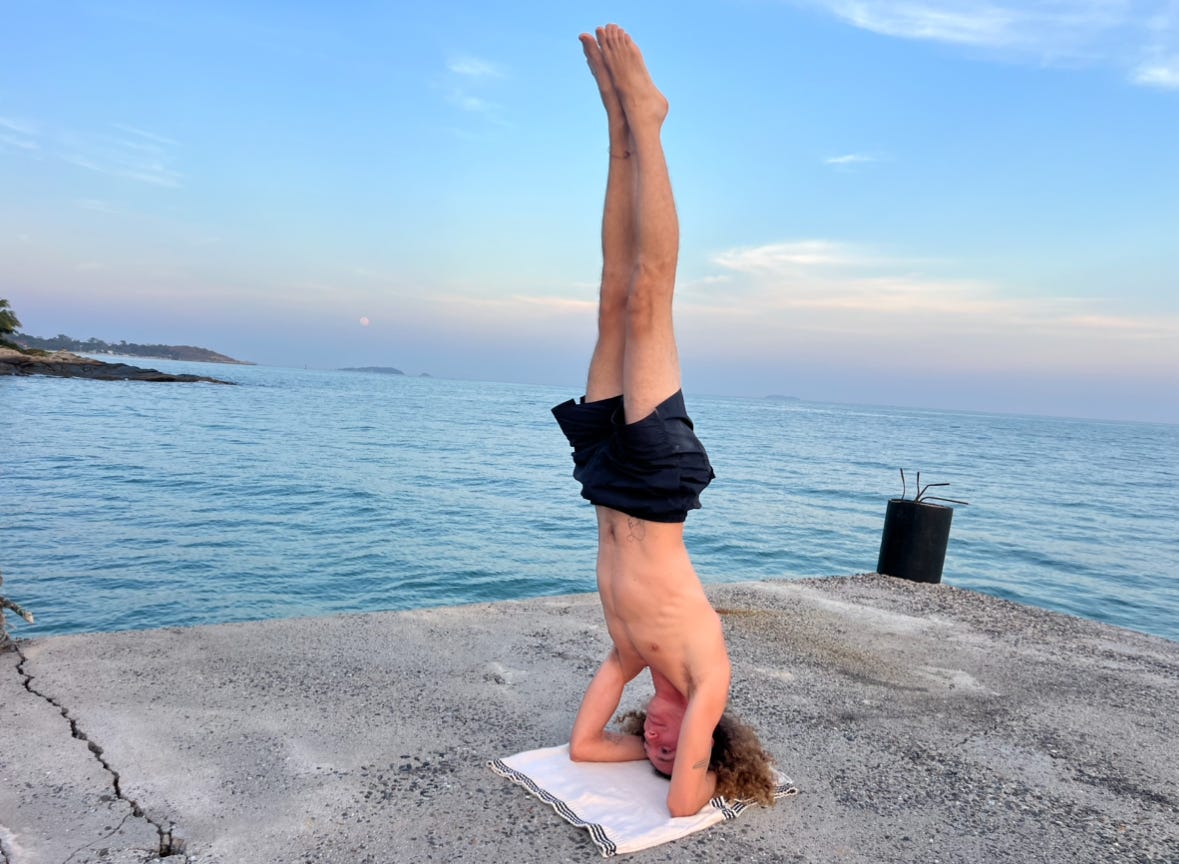
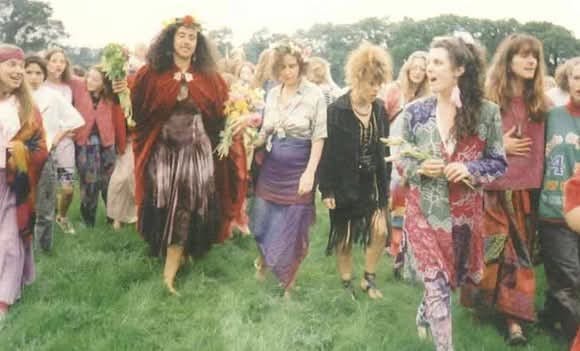
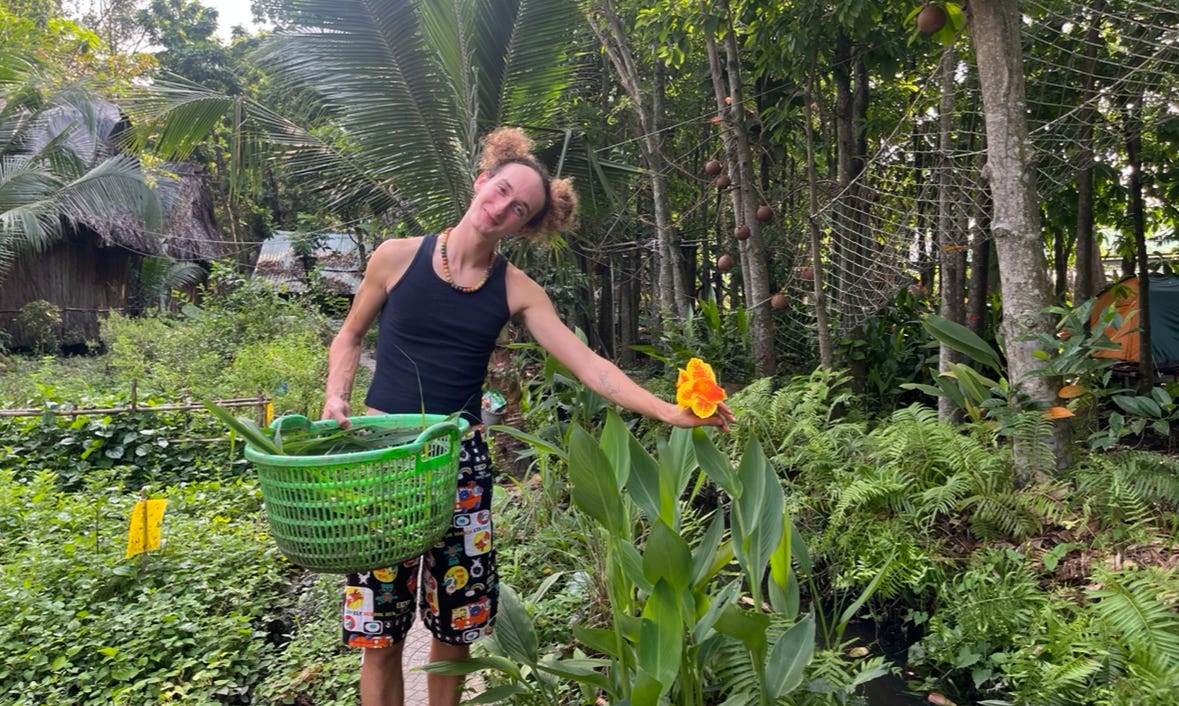
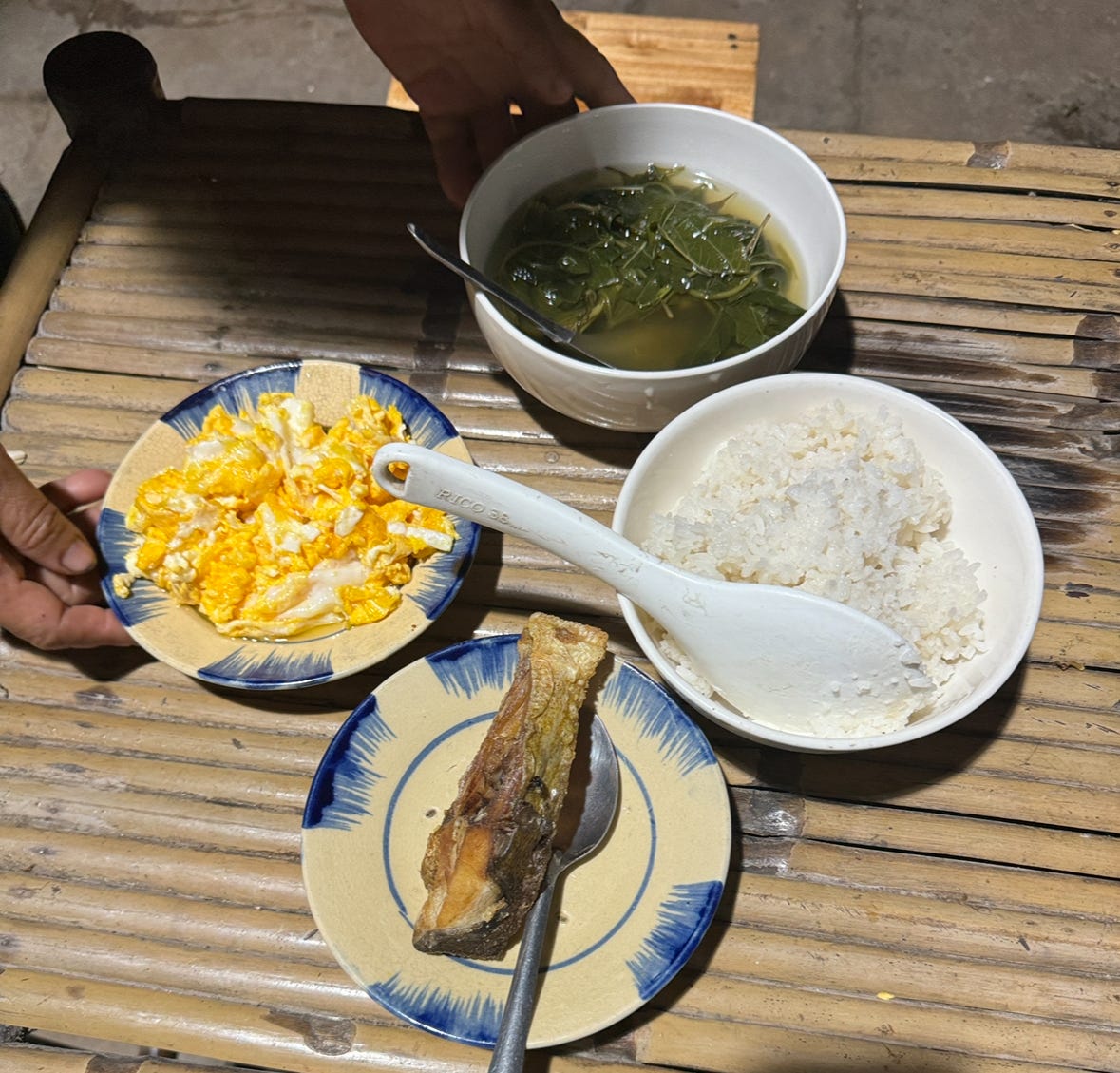

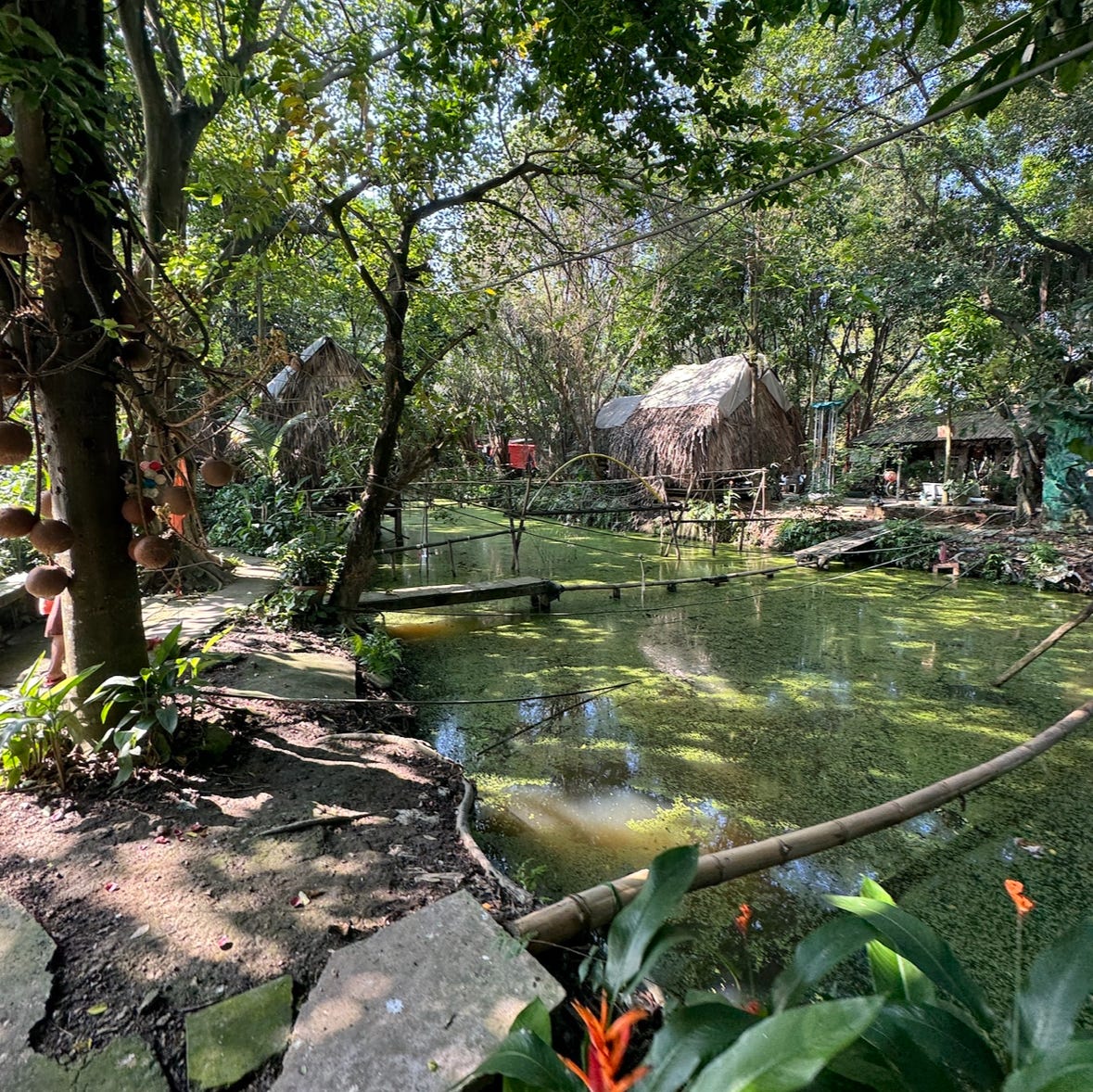
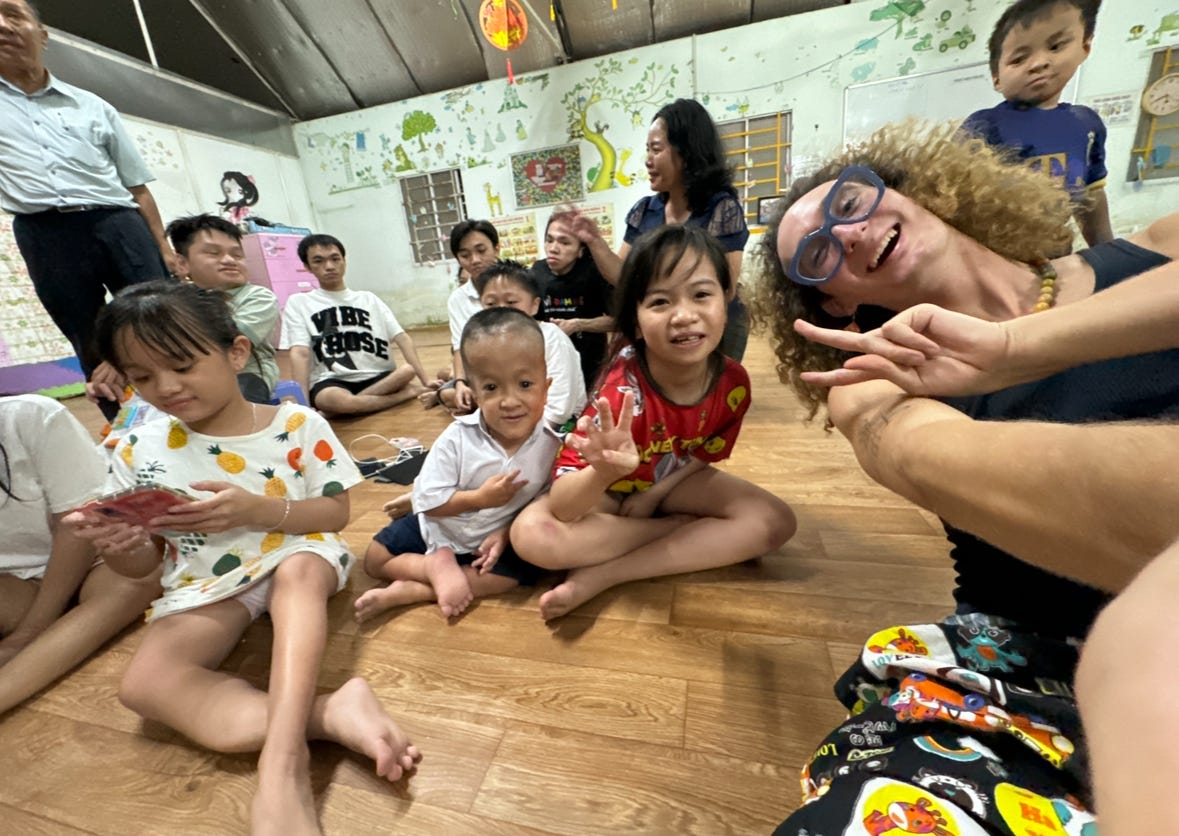
Journaling is such a good practice! I use my blog as a place to write out my thoughts and reminisce on things. It’s not always grammatically correct, but it’s so good to get out what is in my head.